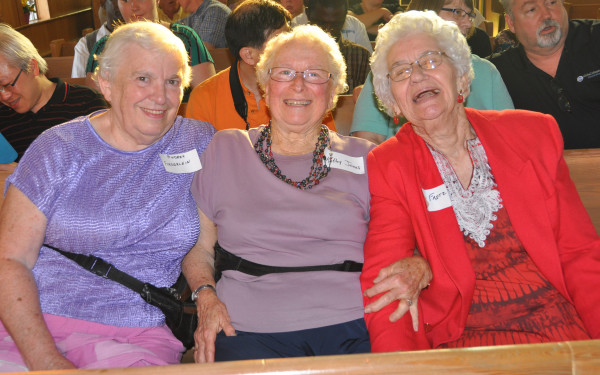04 Jun Shirley Fretz – 18 Years in Sierra Leone
Steve Dennie, Communications Director
On the second night of General Conference–Thursday, May 30–the evening service was held at the Grace UB church in Sherkston, Ontario. It was a good place for an international gathering. Grace has been a strong missions-minded church over the years, producing a number of missionaries and faithfully supporting the work of United Brethren missions. Pastor Dan Nickless said they view themselves as a sending church, having raised up so many missionaries and pastors since the church began in 1897.
In the congregation that night were three former missionaries in Sierra Leone:
- Kathy Jones, a nurse at Mattru Hospital 1958-1967.
- Audrey Federlein, who served in Mattru at Centennial Secondary School 1965-1968 in various capacities–math teacher, dean of girls, and for two years, national president of the Christian Endeavor Union.
- Shirley Fretz, who served 18 years in Sierra Leone, 1967-1985.
Back in 1985, after she concluded her missionary service, I interviewed Shirley Fretz and wrote an article for the United Brethren magazine. I tracked it down.
Growing up at Grace UB, Shirley Fretz dreamed of being a missionary, like two other women from the church who were then serving in Sierra Leone–Olive Weaver and Ruth Benner. She spent ten years working for law firms, but couldn’t escape the missionary call. She eventually responded to an altar call by Bishop Clyde W. Meadows, a call to serve Christ wherever he wanted.
Before she knew it, she was contacted by the UB missions office. They needed someone to oversee the Minnie Mull school boarding home in Sierra Leone. Was she interested?
She arrived at Minnie Mull in April 1967. The school had over 400 primary-age girls with 104 staying in the boarding home. Shirley procured supplies, kept financial records, helped supervise cooking and laundry, counseled children, and generally served as a mother to over 100 youngsters.
Her second term, which began in August 1971, found her in a whole new role: business manager of Mattru Hospital. She spent the next ten years at Mattru handling the payroll, bookkeeping, banking, and other non-medical responsibilities. After the October 1974 arrival of Dr. Ron Baker, Shirley watched Mattru develop into a thriving hospital.
In 1981, Shirley decided the hospital needed a male administrator, especially since the culture favored having men in supervisory positions. Shirley returned to Canada to find a job, but the UB Missions office had a different idea. They asked her to work with Sierra Leone churches in Christian education. So she returned for two more terms.
This time, Shirley lived in Bumpe. For four years, she devoted much of her time to the Bumpe Primary School children. After school, kids walked to her house for Bible classes, and she also had the opportunity to provide one-on-one spiritual counsel. Later, her job was placed under the direction of the national church’s Christian Education Department. They held clinics and workshops in various distrusts, helped with the camping program, and emphasized Christian Endeavor.
Shirley’s mother wrote her a letter nearly every week during those 18 missionary years. The letters often arrived three or four at a time. Shirley tried to be just as faithful in writing back.
“She was very happy when I became a missionary,” Shirley said of her mother. “She had been praying for Sierra Leone before I was even born. Tears came every time I left for Africa, but she knew the Lord wanted me there.”
Shirley’s father died in December 1983. He had been hospitalized almost continuously since July 1982 with cancer. Several times, when his condition appeared especially bad, the family was called to the hospital. Shirley, on furlough at the time, had a difficult decision to make: should she stay home, or return to Sierra Leone in December as scheduled?
“My dad was very alert right up to the end,” she recalled. “He knew exactly what was going on, and I’m sure that if I had visited him the day I was supposed to leave for Africa, he’d have said, ‘What happened? Why didn’t you go?’ I knew he would be gone soon, and it would be good for me to be there, but you can’t just stay home and wait for something to happen.”
So she left at the end of November and arrived in Bumpe on December 6, 1983. The next day she received a telegram saying her father had passed away on December 6.
“Bishop Datema was in Sierra Leone at the time, and he asked me if I wanted a memorial service. It was held the same day as the funeral at home. The Bumpe church was full. Many people came, even though they didn’t know Dad. The Bumpe primary children sang a couple of Dad’s favorite songs, and then Bishop Datema preached a very meaningful message which I greatly appreciated. It was almost like being home for the funeral.”
Although Shirley fully supported the nationalization process, it brought an end to her position.
Everyone knew Shirley was leaving the country–this time for good–on Monday, August 19. The stream of constant good-byes began on Saturday. “I must have had 50 people visit my house between Saturday afternoon and Monday morning. To Sierra Leoneans, people are important. When they know you are leaving, everybody wants to come and spend time with you. It was rather hard saying good-bye to all the people I had grown close to during my 18 years there, knowing I might not see them again.”
Shirley wanted to remain in some kind of mission work. She had invitations to interview with a variety of mission agencies, and accepted a position as receptionist-bookkeeper for the Brethren in Christ missions office in Stevensville, Ontario. She started on December 2, 1985.


No Comments